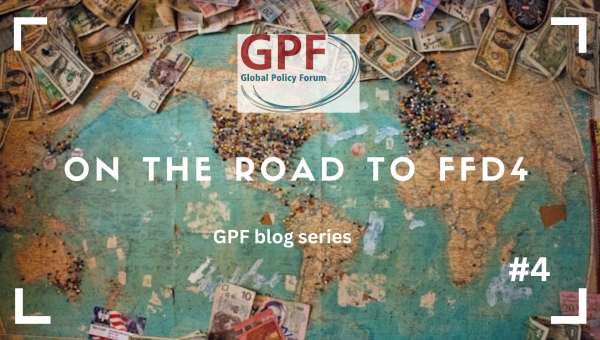News

By Bodo Ellmers
Debt, taxes and geopolitics took centre stage in this year´s UN Financing for Development (FfD) Forum. The debates and negotiations took place as the preparatory process for the Fourth International Conference on Financing for Development (FfD4) was already underway. They preceded the first negotiating session of the UN General Assembly´s new Ad Hoc Committee on International Tax Cooperation, which began immediately afterwards. Fiercely negotiated were the outcome document´s paragraphs on international tax cooperation and unilateral coercive measures (UCMs, also known as sanctions). Due to the UCM dispute, an amendment and eventually the whole outcome document was put to vote, for the first time since 2016, when the UN started the series of FfD Forums. The serious debt problems of developing countries dominated the debates at the Forum.
Debt at the center
The UN Secretary-General, António Guterres, opened the session by highlighting the critical debt situation in developing countries. According to Guterres, debt service has increased by 50% in the last three years, widening the financing gap for development tasks. Attempts by the G20 to reduce the debt burden of low-income countries through a “Common Framework on Debt Treatments” have failed. Paula Narvaéz, the President of the UN Economic and Social Council (ECOSOC) called for better mechanism for resolving debt crises. The Ambassador of Uganda, speaking on behalf of the Group of 77 and China (G77) reiterated the call for a multilateral debt workout mechanism. These comments were made against the backdrop that developing countries´ attempts to finance development with debt finance from the private sector and MDBs – as stipulated in the Addis Ababa Action Agenda – have pushed debt levels to record highs. Rising interest rates following the interest rate turnaround in 2022 have increased debt servicing massively.
Debt architecture reform remains high on the agenda, but the Forum only reaffirmed last year´s agreement to consider the creation of a “tool” to incentivize or enforce private creditor participation in debt restructuring. Loans and bonds from private creditors are the most expensive debt for developing countries because of the high risk premiums they charge, partly as a result of poor ratings from private credit rating agencies. Despite the rhetoric, no real progress on debt architecture reform was reported or agreed. On multilateral debt, the Forum welcomed the new debt service suspension clauses introduced by the World Bank and suggested similar clauses in areas beyond climate. Little progress could be reported on the adoption of such clauses by bilateral creditors or other MDBs. It now seems certain that the topic of debt and debt architecture reform will be the dominant theme of the FfD4 conference. Expectations are high that there will be a breakthrough at the Summit in Spain next year.
Tax negotiations
The most important innovation in global economic governance since last year´s forum was the establishment of an intergovernmental tax body at the UN General Assembly. The issue had already been a focus of the FfD3 conference in 2015, but failed to achieve the necessary consensus at the Addis Ababa Summit. Persistent pressure from the Africa Group and civil society organisations over the following years finally led to support by the G77 in 2023, when a voted UNGA resolution mandated an Ad Hoc Committee of the UN General Assembly to begin work on a UN framework convention on international tax cooperation. Member States of the OECD, which until recently dominated tax policy-making, have since been half-hearted participants in the UN process. An agreement on working modalities could be reached by consensus in February, at the organizational session of the new committee. The first substantive session was scheduled to take place immediately after the FfD Forum.
Negotiations on the relevant part of the outcome document (paragraph 27) were one of the reasons for the delay in its adoption. In the end, however, the Forum adopted supportive language, which is another positive step towards strengthening international tax cooperation at the United Nations.
Geopolitics again
There is a significant risk that FfD4 will be derailed by geopolitical sideshows. Paragraph 72 on UCMs was the main reason why, for the first time at an FfD Forum, an amendment was put to a vote. The amendment to delete the paragraph failed to gain a majority, mainly due to the rejection by the G77, which represents more than half of the member states and, of course, always has a majority in UNGA votes. In the closing debate, a number of G77 member states stressed that UCMs were detrimental to sustainable development, while the EU presidency countered that sanctions were a legitimate tool to address actions that violate the UN Charter, an apparent reference to the invasion of Ukraine by Russian troops. The debate was rather symbolic, as the language in paragraph 72 is simply agreed language from the 2030 Agenda 2030 resolution, so it did not establish anything substantively new.
But the fight over the amendment meant that, for the first time ever, an FfD Forum outcome document also had to be voted on. When this happened, it was adopted with two abstentions, but without any votes against. On the positive side, this showed that UN Member States value the FfD process, and want it to produce results despite geopolitical tensions. Other processes have been blocked by disputes over UCM language, for example the IMF and World Bank Spring Meetings a week earlier, whose governing bodies failed to adopt communiqués due to disagreements over how to address the war between Russia and Ukraine. For the FfD4 conference, this is a sign of hope, but the struggles at the 2024 FfD Forum also indicate that the road ahead is a bumpy one.
